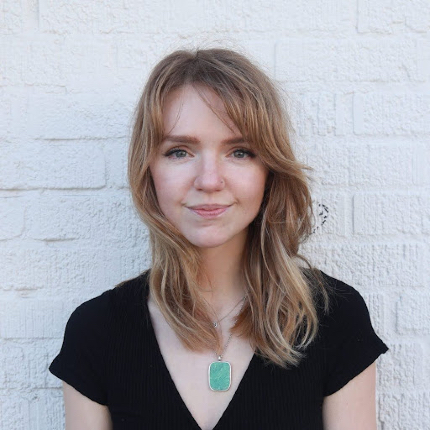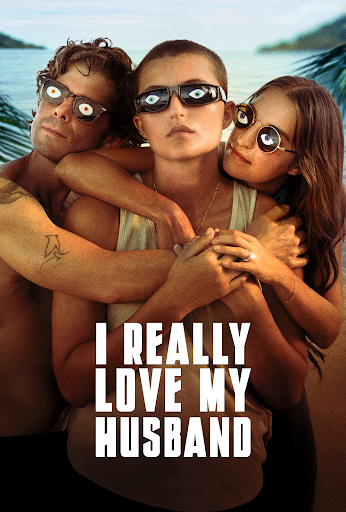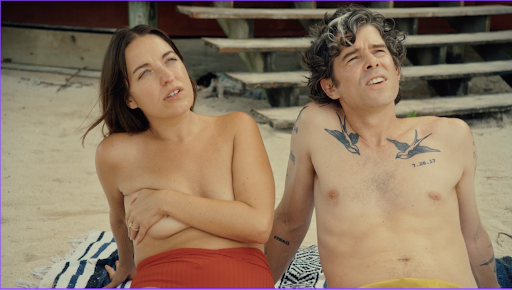SXSW 2025 Interview: GG Hawkins Talks I REALLY LOVE MY HUSBAND, Not Settling, Individuals As Islands

Teresa (Madison Lanesey) and Drew (Travis Quentin Young) are on vacation. Well, actually it's their belated honeymoon.
Teresa really hit the jackpot with her husband. Drew is the 'perfect man'. He's kind and courteous, with a friendly word and helping hand for everyone -- and it's really pissing her off.
Yes, the course of untrue love never did run smooth, and the mismatched duo decide what they must need is to spice things up a bit. Enter Paz (Arta Gee), their charismatic nonbinary beach hut host. Seeing them across the beach and really liking their vibe, the two decide to pursue them, both together and individually. But what these affairs unlock will change everything.
I Really Love My Husband is acerbic, wise, and surprisingly profound in its acceptance of our flaws and fumbles. Its first-time feature director, GG Hawkins, knows this industry well, but from a different angle. Clicking 'record,' we settle in for an interview that, like her film, moves at a different pace to most.
You host the 'No Film School' podcast, which makes for an interesting backdrop to an interview. You're used to probing films with their creatives. How does it feel being on the other end of that creative equation?
I feel like I want to just talk shop with you, being press, being the curious interview person. What was interesting about making this movie, in the context of hosting the podcast, is that I was sharing the highs and lows along the way with the listeners. So there's a lot of community tied to that process. In one episode, I played a recording where I was crying in the car and venting [about the film] with Jason Hellerman, my co-host. In an interview, I'd drop in an anecdote and be like: "oh yeah, on my movie, which we're coloring right now, we discovered this thing". I learned along the way from whoever I was interviewing. It's bizarre to be on this side now. I feel honored.
There are, of course, many films about falling in love -- but there aren't so many films about having those affections tested, or finding them fluctuating all of a sudden. What prompted you to try out this concept and see if it worked?
I came to the concept knowing that I had access to this location in Panama, where we had community. My stepdad lived there for sixteen years. The character of Paz is inspired by him. He's a British expat who didn't graduate the equivalent of high school, and instead travelled the world. I knew that I loved making things with Madison Lanesey and Scott Monahan and Ryan Thomas, the DP, and Christina O'Sullivan, the editor. So I was like, okay, I have these elements in this location: what could happen?
I'd been circling a breakup story. I had made a short called Break Cute that just didn't work. I recut it into a six-minute short about a dog that gets adopted and thinks he's been kidnapped called Rescue. It's like Homeward Bound meets Taken. But it was originally about a couple going to upstate New York and breaking up. Ultimately, I think I wanted to tell a story about everything in a relationship being good on paper but something still being wrong. What do we do to either address or not address the elephant in the room, which is that I'm not happy even though you're perfect?
It's a highly empathetic film in terms of how you treat your protagonists. They're flawed, they're sometimes unlikable. But, you watch this film, and you think "I know people like this. I have friends like this". How do you go about writing characters that are so deeply flawed but still ensure that we feel for them?
I'm so glad that you felt for them. I think sometimes barriers go up when people watch the movie, because maybe it's too much like looking in a mirror. I really like characters who are flawed, and I like exploring the ugly side of them. How far will somebody overcompensate to avoid looking at themselves and acknowledging what they really want? I think it's fun to play in those grey areas.
Madison Lanesey, who plays Teresa -- we developed the character together based off of our own experiences, our past relationships, ourselves, and that nuance in 'settling'. I've been in a relationship in the past where I was like "well, I guess this is it". It took something big happening to rip me out of that world. I remember ending that relationship and having two months where I thought: I think I'm going to be alone forever, and I guess that's okay. And now I'm engaged and I found love, thank god. But I think the idea of settling is very real. I've been at weddings where I'm like, well, she's great, but I don't understand why she's settling for this guy.
I think it's very human, that ugliness that comes out when we're not willing to actually acknowledge what we really want. Divorce is really hard -- I'm a child of divorce. It's life changing. It reminds me of that explanation from Cat Person, the short story: sometimes it's easier to just get on the train and roll with it. I think that happens in relationships too, but this is a spoiler, so I won't get into the details.
You had the island already. Were you thinking: let's make a couples therapy film because that suits an island? Or did you have a couples therapy film in mind and go: hey, we've got the island? Which way around was it?
Island first. And, knowing the people that I wanted to be developing it with and knowing what Madison as a performer could pull off, it started with the threesome angle.
It feeds into itself, the island being like when you're alone in a relationship. The original title when we were shooting was 'An Island'. I loved it. But I learned that if you name a movie 'An Island', nobody knows what it's about. And they might think it's a bad one.
It's cool that this film is about people, not gender. When you've got a logline that contains one woman, one man, and one non-binary person, you expect it to go in a certain direction. And it doesn't. Have you found it hard to pitch this film with that in mind?
It's so interesting. The pitch itself doesn't really even acknowledge gender. And that was intentional. We cast openly for Paz. I didn't know who they were yet. All I knew is that they needed to have chemistry with everyone and be a believable expat living on an island.
I want to see more stories in the world about people of all genders existing and being whole people who make mistakes and aren't perfect. Their gender is irrelevant to the story, because to me that's where I'm at with a lot of people in my community and in my family. It was like, let's not make it a thing when it doesn't need to be a thing. It's just who we are.
Tell me more about Paz and the casting that you did end up with. Arta Gee's performance is hilarious, and it's also a non-binary archetype that somehow hasn't existed in cinema before but they play it as if this character type has always been there. We laugh with that and we recognize it, but we haven't seen this on film before.
I knew when we were casting that Paz needed to be somebody who could easily connect with people. Our casting director, Emma Fleming, had read the script, and she brought up this runway model from a fashion shoot, Arta Gee. Emma's friend had been styling them and said: "I just met the most wonderful person in the world who I couldn't stop laughing with, and everyone was connecting with them". It's great, especially in indie film, to cast and craft characters based on who the actors are. It's a fun way to explore, and then let the characters become even more who the actor is. Then it becomes sort of seamless.
Tell me about the diverse nature of your creative team and your talent. There are some impressive stats that are cited in the press kit. [50% of the lead actors are non-binary, 75% identify as LGBTQ. The film boasts an all-female producing team and a crew where 70% of department heads are women, 24% of whom identify as LGBTQ].
We tried pretty intentionally when we were hiring folks to proactively engage with communities that are underrepresented in the film industry. We had a lot of folks in the Panama film industry who were fundamental to making the project. We would get introduced to folks in the most random of ways. Suddenly we were like, "wow, we cannot do this without Faisal [Alberto Tisnes]", who came on as our key grip and did our behind the scenes stills. Then Faisal says: "oh, are you looking for any music? I have my friend from Colombia, who lives in Panama now and shoots films there. He also makes music." We had such a mix of talent, and a lot of folks from backgrounds that aren't conventional for filmmaking. Before the podcast, I worked in ad sales. I was the least film school person on set. It's our superpower, how different we all are.
What do you want your audiences to walk away from this film with?
If you can't love yourself, you can't love anyone else.
I Really Love My Husband world premieres at SXSW on 7th March.











